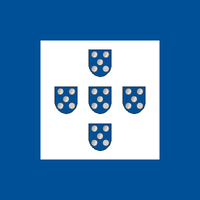National Union (Portugal)
National Union União Nacional | |
|---|---|
 | |
| Founder | António de Oliveira Salazar |
| Founded | July 30, 1930 |
| Dissolved | 1974 |
| Headquarters | Lisbon, Portugal |
| Youth wing | Mocidade Portuguesa |
| Paramilitary wing | Legião Portuguesa |
| Ideology |
Portuguese nationalism Lusitanian Integralism Clerical fascism Authoritarianism |
| Political position | Far-right |
| Religion | Roman Catholicism |
| International affiliation | None |
| Colours | Blue and white |
The National Union (Portuguese: União Nacional; Portuguese pronunciation: [uniˈɐ̃w̃ nɐsiuˈnaɫ]) was the only legal political party in Portugal for most of the period of the Estado Novo. Ideologically, the National Union was an authoritarian, clerico-fascist organisation. It was dominated by António de Oliveira Salazar during most of its existence. Unlike in most single-party regimes, the National Union was more of a political arm of the government, rather than holding actual power over it.
History
The organization was founded in 1930 during the National Dictatorship period of 1928–33. Officially it was not a political party, but an "organisation of unity of all the Portuguese". For the next 43 years, it effectively held a monopoly of power in the Estado Novo. The opposition Movement of Democratic Unity was legal in 1945–48, but even then the political system was so heavily rigged that it had no realistic chance of winning.
The party won all seats in elections to the Portuguese National Assembly from 1934 to 1973. Opposition candidates were nominally allowed after 1945, but prematurely withdrew in the 1945 and 1973 elections. In 1970 – two years after Salazar had been replaced as leader and prime minister by Marcello Caetano – the name of the party was altered to Acção Nacional Popular (People's National Action), and subsequent to Salazar's retirement faced formal competition in the 1969 election, nevertheless winning all constituencies in a landslide.[1]
The party had no real philosophy apart from support for the regime. As a result, it melted away after the Portuguese Revolution of 1974. It has never been revived, and no party claiming to be its heir has won any seats in the Assembly of the Republic in modern democratic Portugal.
List of Presidents
- 1930–1968 – António de Oliveira Salazar
- 1968–1974 – Marcelo Caetano
Electoral results
| Corporative Chamber | |||||
| Election year | # of overall votes |
% of overall vote |
# of overall seats won |
+/– | Leader |
|---|---|---|---|---|---|
| 1934 | 476,706 (#1) | 100 | 100 / 100 |
|
|
| 1938 | 694,290 (#1) | 100 | 100 / 100 |
|
|
| 1942 | 758,215 (#1) | 100 | 100 / 100 |
|
|
| 1945 | unknown (#1) | 100 | 120 / 120 |
|
|
| 1953 | unknown (#1) | 100 | 120 / 120 |
|
|
| 1957 | unknown (#1) | 100 | 120 / 120 |
|
|
| 1961 | 973,997 (#1) | 100 | 130 / 130 |
|
|
| 1965 | unknown (#1) | 100 | 130 / 130 |
|
|
| 1969 | 981,263 (#1) | 87.99 | 130 / 130 |
|
|
| 1973 | 1,393,294 (#1) | 100 | 150 / 150 |
|
|
See also
- Mocidade Portuguesa, the Estado Novo's youth organization
- Portuguese Legion, the Estado Novo's paramilitary organization
Footnotes
- ↑ "Portugal, 1969" (PDF). PORTUGAL - Assembly of the Republic - Historical Archive Of Parliamentary Election Results. Inter-Parliamentary Union (www.ipu.org). Retrieved 8 October 2012.